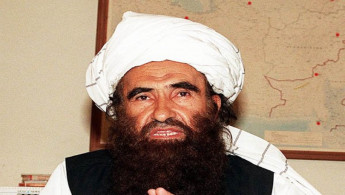Taliban say founder of Haqqani network dies in Afghanistan
The founder of the Haqqani network, one of Afghanistan's most effective and brutal militant groups, has died after a long illness, their affiliates the Afghan Taliban announced on Tuesday.
Jalaluddin Haqqani, a one-time CIA asset whose group became a top US target, spent decades working with groups such as al-Qaeda and the Taliban to entrench jihadism in the conflict-racked region.
Despite his fearsome reputation, his death is not expected to have an impact on the extremist group's operations.
Jalaluddin, thought to be in his 70s or 80s, had been bedridden for years and had already passed the leadership to his son Sirajuddin, who is also the Taliban's deputy leader.
Jalaluddin "was from among the great distinguished Jihadi personalities of this era", the Taliban said in a statement posted on Twitter.
He "was ill and bedridden for the past several years", the group added.
It did not specify where or when he died. Unverified reports have placed him in Pakistan in recent years.
During the 1980s Jalaluddin Haqqani was an Afghan Mujahideen commander fighting the Soviet occupation of Afghanistan with the help of the US and Pakistan.
He gained fame for his organisation and bravery, garnering attention from the CIA and a personal visit from US Congressman Charlie Wilson who helped secure arms for the Mujahideen, armed resistance to Soviet occupation.
A fluent Arabic speaker, Jalaluddin also fostered close ties with Arab jihadis including Osama bin Laden who flocked to the region during the war.
Later, Jalaluddin became a minister in the Taliban regime which took power in Afghanistan in 1996.
There had been rumours of his death before, in 2008 and 2015, though this was the first time the Taliban have issued a statement on it.
The Haqqani network has been blamed for spectacular attacks targeting civilians, Afghan and US-led NATO forces across Afghanistan since the Taliban were toppled from power in 2001.





 Follow the Middle East's top stories in English at The New Arab on Google News
Follow the Middle East's top stories in English at The New Arab on Google News
![Dozens of people turned out for the funerals [Getty]](/sites/default/files/styles/image_330x185/public/2024-11/GettyImages-2185229760.jpg?h=e7c891e8&itok=1bctDcE6)
![The UAE is widely suspected of arming the RSF militia [Getty]](/sites/default/files/styles/image_330x185/public/2024-11/GettyImages-472529908.jpg?h=69f2b9d0&itok=Yauw3YTG)
![Netanyahu furiously denounced the ICC [Getty]](/sites/default/files/styles/image_330x185/public/2024-11/GettyImages-2169352575.jpg?h=199d8c1f&itok=-vRiruf5)